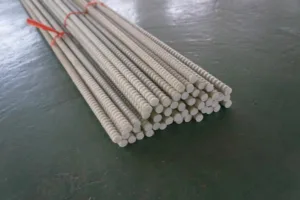Construction projects require sturdy and reliable reinforcement materials to ensure the longevity and structural integrity of various structures. In recent years, two alternatives to traditional steel rebar have gained popularity in the construction industry: basalt rebar and fiberglass rebar. These materials offer unique characteristics that make them viable options in specific applications. In this article, Unicomposite Pultruded Profiles will compare basalt rebar and fiberglass rebar in terms of their strength, durability, cost, installation, environmental impact, suitability, and provide a comprehensive analysis to determine which one prevails in the strength showdown.

basalt rebar vs fiberglass rebar
Introduction
Before diving into the specifics of basalt rebar and fiberglass rebar, it is essential to understand the significance of reinforcement in construction. Reinforcement materials, such as rebar, enhance the structural strength of concrete by providing tensile strength and resisting cracking. Traditional steel rebar has been the go-to choice for many years due to its strength. However, advancements in technology have introduced alternatives like basalt rebar and fiberglass rebar that offer distinct advantages.
Strength and Durability Comparison
The tensile strength of reinforcement materials is a critical factor in determining their effectiveness. Basalt rebar, derived from volcanic rock, exhibits impressive tensile strength comparable to that of steel. On the other hand, fiberglass rebar, composed of glass fibers embedded in a polymer matrix, also possesses high tensile strength but may vary depending on the manufacturing process.
In terms of durability, both basalt rebar and fiberglass rebar offer excellent resistance to corrosion. Unlike steel rebar, they are not susceptible to rust, making them suitable for applications in harsh environments, such as coastal areas or structures exposed to chemicals.
Cost Analysis
When considering reinforcement options, cost plays a significant role in decision-making. Basalt rebar tends to be more expensive than traditional steel rebar but offers long-term cost benefits. Its resistance to corrosion eliminates the need for costly maintenance and repairs, ultimately resulting in lower lifecycle costs. On the other hand, fiberglass rebar can be more cost-effective upfront but may require more frequent inspections and maintenance.
Installation and Handling
The installation process and ease of handling can impact construction timelines and labor costs. Basalt rebar is comparable to steel rebar in terms of handling and can be easily cut and bent using conventional tools. Fiberglass rebar, being lighter and less dense than steel, is even easier to handle and transport. However, special considerations may be required during installation to prevent damage to the surface of the fiberglass rebar.
Environmental Impact
Sustainability has become a significant concern in the construction industry. Basalt rebar offers a more environmentally friendly option compared to steel rebar as it is made from natural volcanic rock and requires less energy-intensive manufacturing processes. Additionally, basalt rebar is recyclable and leaves a smaller carbon footprint compared to steel rebar. Fiberglass rebar, while not as eco-friendly as basalt rebar, still offers advantages such as the potential for recycling.
Applications and Suitability
Both basalt rebar and fiberglass rebar find their applications in various construction projects. Basalt rebar is particularly well-suited for applications that require resistance to extreme temperatures, such as bridges or pavements in cold regions. Fiberglass rebar, with its non-magnetic properties, is ideal for structures that require electromagnetic neutrality, such as MRI rooms or sensitive electronic facilities. Evaluating the specific requirements of each project is crucial in determining the most suitable option.
Case Studies and Testimonials
Real-world examples and success stories can provide valuable insights into the effectiveness of basalt rebar and fiberglass rebar. Numerous construction professionals have reported positive experiences with these alternative reinforcement materials, highlighting their ease of use, durability, and cost-effectiveness. These case studies and testimonials serve as a testament to the advantages offered by basalt rebar and fiberglass rebar in different applications.
Conclusion
In the strength showdown between basalt rebar and fiberglass rebar, both materials present compelling advantages and unique characteristics. Basalt rebar showcases impressive tensile strength, durability, and a lower carbon footprint, making it an environmentally friendly choice. Fiberglass rebar, on the other hand, offers cost-effectiveness and ease of handling. Ultimately, the choice between the two depends on specific project requirements and priorities. Consulting with construction professionals and considering the application’s demands will help make an informed decision.
FAQs
1. Is basalt rebar stronger than fiberglass rebar?
Basalt rebar and fiberglass rebar both possess high tensile strength, but the exact strength may vary depending on the manufacturing process. In general, basalt rebar exhibits comparable strength to traditional steel rebar.
2. Are basalt rebar and fiberglass rebar more expensive than steel rebar?
Basalt rebar is usually more expensive than steel rebar upfront. However, it offers long-term cost benefits due to its resistance to corrosion, resulting in lower maintenance and repair costs. Fiberglass rebar may be more cost-effective initially but may require more frequent inspections and maintenance.
3. Can basalt rebar and fiberglass rebar be easily installed and handled?
Both basalt rebar and fiberglass rebar are relatively easy to handle and install. Basalt rebar can be cut and bent using conventional tools, while fiberglass rebar, being lighter and less dense, is even easier to handle and transport.
4. Are basalt rebar and fiberglass rebar environmentally friendly?
Basalt rebar offers a more environmentally friendly option compared to steel rebar. It is made from natural volcanic rock and requires less energy-intensive manufacturing processes. Fiberglass rebar also offers advantages in terms of potential recycling.
5. Which reinforcement material should I choose for my project?
The choice between basalt rebar and fiberglass rebar depends on specific project requirements. Consider factors such as the application, environmental considerations, cost implications, and durability to make an informed decision.
 info@unicomposite.com
info@unicomposite.com


























